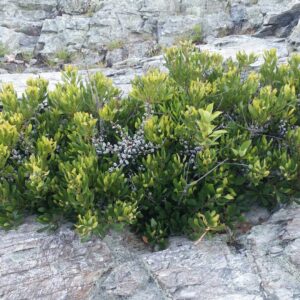Showing the single result
Northern Bayberry Shrubs
The Northern Bayberry shrub, also known as Myrica Pensylvanica, is a dense shrub native to the eastern U.S. Often planted as a hedge, the bayberry will typically grow five to ten feet tall and wide. These shrubs will thrive the best when planted in a woodland garden and they can withstand salty waterfronts or windy climates.
Some bayberry shrubs will have male flowers, and others will have female flowers. After a successful pollination, the female plant will produce gray-blue fragrant berries often used to make aromatic candles and soaps!
Growing Bayberry Shrubs
Bayberry shrubs are sunshine lovers. That’s why you should always aim to plant them in the spring or fall. The plant thrives the best when they are placed in full sun. However, they can still benefit if there is slight shade.
Typically they can grow in a variety of different soil conditions as long as it is well-drained. Don’t be surprised to see these shrubs in both very dry grounds as well as marshy areas. Because the bayberry is a nitrogen fixer, these plants are unlike others because they can thrive in poor soil conditions.
Nitrogen-fixing plants, like the bayberry shrub, have roots that are colonized by certain bacteria that extracts nitrogen from the air and converts it into a form that is required for their growth.
Caring for Your Bayberry Shrub
The bayberry shrub will flourish in the climate conditions throughout its hardiness range of USDA zones 3 to 7. These plants are slow-growing, so you won’t need to worry about pruning them often, if at all. Bayberry shrubs spread by root sucker, so you may need to remove new plant growth if you’re not interested in having them cover certain areas of your yard.
Because bayberry shrubs extract nitrogen from the air, they grow very well, even in poor conditions. There is no need to feed a bayberry shrub either. As the shrub continues to grow, it will improve the soil’s nutritional value and has been known to be used in soil restoration efforts.
Recommended Areas to Grow
Bayberry shrubs are great because they usually grow well in almost any climate. Typically the shrub is planted in groups in woodland gardens. It pairs well in a landscape with evergreens and other woodland plants.
This is a wonderful shrub to include in your home landscaping because of its low, tufted shape and glossy leaves. They are perfect for creating informal hedges around your front and backyards, as well as around your driveway.
Don’t forget. They also have a tolerance for salty soils. For that reason, they are often planted along seashores and roadsides that are salted in the winter. People often plant these shrubs in the summer and autumn because they are known for producing blue-gray berries that stand out in your winter landscape.
Varieties of Bayberry
When used for landscaping, it is typically only the native species that are planted. Wildwood is the cultivator of the bayberry. It is the product of an open crossing of four native selections of the mid-Atlantic region. Growing about six to seven feet in height, the wildwood is semi-evergreen.
Then there is the M. Pensylvanica, which is also known as the Northern bayberry. This form of bayberry bush is native to the eastern seaboard. However, it is generally found further south.
Myrica cerifera is the southern relation of bayberry shrubs. This version of the shrub is native to North and Central America, as well as the Caribbean. The leaves are long, leathery, and have serrated edges.
Bayberry Fruit Growth
The bayberry shrub will grow small, dark gray, hair, wax-covered fruit in June. Then, it’s ready to be picked by October. The fruit will remain available on the shrub until the spring.
When you boil the ripe berries, it will release a wax that can be used to make candles. Historically, the berries were also used as a supplement to help treat various ailments, including cold and flu symptoms.
Importance to Wildlife
The bayberry shrub is beneficial to wildlife. Although it is toxic for humans, the fruits found on the bayberry shrub feed multiple birds and wild animals. For instance, many species of songbirds will eat the fruit and seed in small amounts. Other birds like the Yellow-Rumped Warble rely on these berries as a regular food source. And some birds like Tree Swallows will consume the berries as a treat even though their diet is made up of mostly insects.
Besides songbirds, other wildlife animals like Bobwhite Quail, Wild Turkey, Bluebirds, Catbirds, Chickadees, Crows, Meadowlarks, Mockingbirds, Brown Thrashers, Tufted Titmouse, Red-bellied Woodpeckers, Wrens, and Gray Fox will all benefit from the berries on a bayberry shrub. White-tailed deer will also benefit from the shrub by eating the twigs and foliage.
Wholesale Bayberry Shrub in Michigan
At Cold Stream Farm we are a wholesale/retail bare root tree and shrunk nursery in Michigan. Visit us online to learn more about our bayberry shrubs, and contact us today with your questions.

